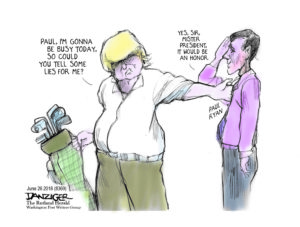Playing Through the Pain
I, for one, am relieved that Tiger Woods decided to devote his unimaginable focus and determination to golfing excellence and not to, say, world conquest. We'd all be living in Tigerland by now.It’s easy to make fun of the pretentious verbiage that’s used to inflate sporting events — and the individuals who take part in them — beyond all earthly reason: “the thrill of victory, the agony of defeat,” “the limits of human endurance,” “the heart of a champion,” blah blah blah. It’s easy to point out that professional athletes, by and large, are absurdly pampered and privileged, and that they are paid their fortunes not to work but to play.
But then somebody like Tiger Woods comes along, and all the hot air seems an exercise in understatement.
Scratch that. I’m not sure we’ve ever seen anyone “like” Tiger Woods. If he weren’t such a charismatic and sympathetic figure, he’d be positively scary. I, for one, am relieved that he decided to devote his unimaginable focus and determination to golfing excellence and not to, say, world conquest. We’d all be living in Tigerland by now.
What Woods did this week to win the U.S. Open is almost inconceivable. We knew before the tournament that he had recently had arthroscopic surgery to remove cartilage from his left knee, and that he hadn’t allowed enough time for proper recovery and rehab. What we didn’t know was that he had been playing for months with a torn anterior cruciate ligament of that same knee, and that several weeks ago he had suffered a “double stress fracture of his left tibia,” which is the large bone in the lower leg.
To review, that’s a ruptured ligament, a broken leg and surgical lesions that hadn’t had time to heal. He was suffering what appeared to be excruciating pain, limping down the fairways and doubling over in agony after hitting a 300-yard drive. He was competing against the best golfers in the world. He finished in a tie with journeyman Rocco Mediate, which meant he had to endure an 18-hole playoff — and, since they finished the playoff tied, one more hole of sudden death.
It makes you wonder if there’s anything Woods wouldn’t do to win a golf tournament.
But why? Woods had already won 13 major tournaments and was well on his way toward his ultimate goal, which is to surpass Jack Nicklaus’ record of 18 majors. At 32, Woods would be in his prime as a golfer for another decade, plenty of time to leave Nicklaus’ mark far behind. Why subject himself to such pain? Why take even the slightest risk of further injuring his knee and jeopardizing his future?
Actually, I think I understand his logic — though I wouldn’t want to play poker with him. He was on an incredible roll (he has won 10 of his last 13 tournaments) and the U.S. Open was being played on a course that he practically owns. There are only four major tournaments a year. As long as he could tolerate the pain, and as long as doctors weren’t using words such as amputation in their efforts to convince him not to play, then why not give it a shot?
The more imponderable question is how. By now, you’ve probably seen the highlight reel. Every time Woods needed to bust a long drive and keep it in the fairway, that’s what he did. Every time he needed to produce a miraculous recovery shot from the sand or the rough, he produced it. Every time he needed to make a long putt to stay alive, he made it. Every single time.
After one of the most amazing, most thrilling athletic performances in memory, Woods is taking the rest of the year off to have his knee rebuilt and give it ample time to mend. When he comes back, he will have had major reconstructive surgery and a long, rust-inducing layoff. If we were talking about anyone else, it would be reasonable to ask whether he’d ever be the same.
But I doubt any such thought has crossed the minds of Tiger Woods’ competitors — world-class golfers who are unlucky enough, and lucky enough, to live in the Tiger Era. Their most pressing concern has to be what happens to the sport in Woods’ absence. His incredible career has been a rising tide that lifted all boats, doubling or tripling the money that pro golfers earn. Now, with him on the sidelines, will anyone watch? Will anyone care?
And after witnessing what Woods did this week, his rivals have to wonder what new humiliations he will inflict when he has two legs to work with instead of just one.
Eugene Robinson’s e-mail address is eugenerobinson(at)washpost.com.
© 2008, Washington Post Writers Group
Your support matters…Independent journalism is under threat and overshadowed by heavily funded mainstream media.
You can help level the playing field. Become a member.
Your tax-deductible contribution keeps us digging beneath the headlines to give you thought-provoking, investigative reporting and analysis that unearths what's really happening- without compromise.
Give today to support our courageous, independent journalists.








You need to be a supporter to comment.
There are currently no responses to this article.
Be the first to respond.